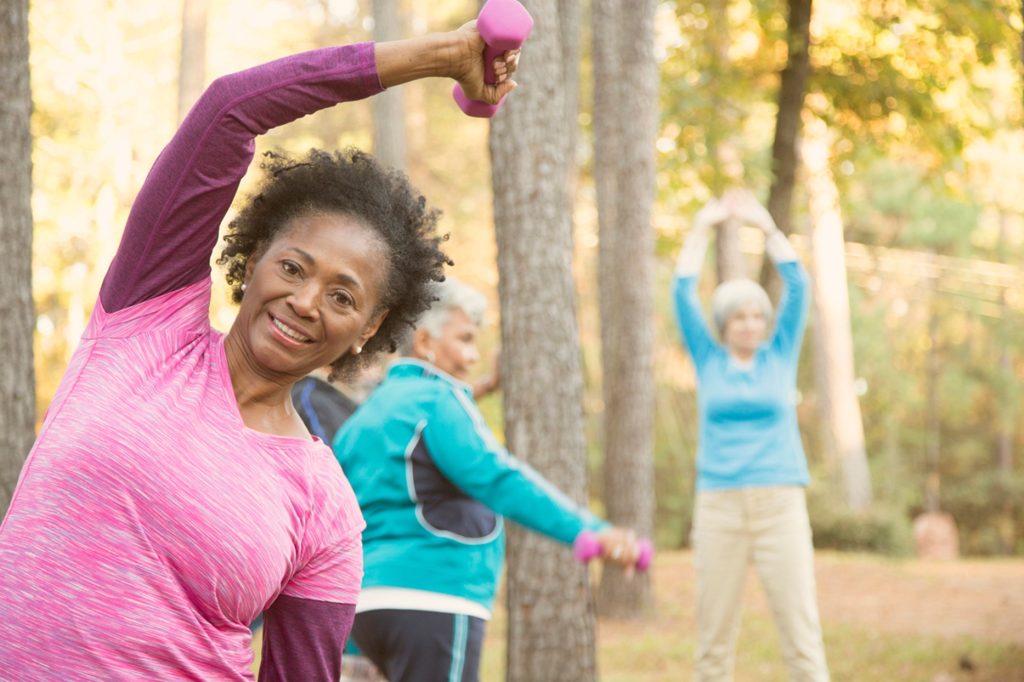Aging is associated with numerous cognitive issues impacting health, safety, and well-being. While the many causes and cures for brain health challenges remain unknown, science and medicine have made significant strides in identifying key factors that can have a positive impact. Here are some immediate, critical steps that an older adult can take to tend to their brain health.
Staying Active to Help Brain Health: Exercise Recommendations for Seniors
According to the Centers for Disease Control, physical activity plays a critical, positive role in brain health. Studies have shown that “cognitive decline is almost twice as common among adults who are inactive compared to those who are active.” The National Institute for Aging, part of the National Institutes of Health, advises that 2.5 hours of exercise a week (or 150 minutes) is the minimum needed for actual beneficial effects, and this should be broken into at least three days a week, with some element of balance conditioning included in the exercise. Older adults should confer with their physician before starting any exercise program, but some possible activities include:
- Walking: Using a pace that elevates the heart rate, walking is one of the best forms of cardio exercise for older adults. A study found that women 65 and older who walked over 2 miles a day experienced significantly less memory loss than women who walked less than half a mile per week.
- Strength Training: In addition to reducing loss of bone density and improving balance, weight training has been found to improve mild cognitive impairment.
- Yoga, Dancing, and Tai Chi: The AARP recommends these forms of exercise as both lower stress on aging bones and muscles and are beneficial to brain health.
The Benefits of Challenging the Brain Through Learning and Socializing
As people age, their lives can become more sedentary in more ways than lack of physical activity. This can lead to social isolation and a lack of other forms of stimulation. However, studies have shown maintaining an active social life is a critical component of brain health in older people. Moreover, socializing is beneficial to mental health – staving off depression, which can impact cognitive decline. Learning also has a vital role in brain health. A new skill, like playing an instrument or speaking a foreign language, has been found to improve cognitive ability and memory in older adults.
Nutritional Tips for Seniors to Help Brain Health
The relationship between food and brain health has become increasingly recognized. Engaging in a diet that is high in certain nutrients and low in other types of foods has a direct, beneficial impact on cognition and memory. Studies have shown that the following nutritional guidelines can help improve brain health.
- The MIND Diet. Developed by the late Martha Clare Morris, a nutritional epidemiologist at Rush University Medical Center, this diet is specifically focused on a diet that helps prevent neurodegeneration. Easily adaptable to other dietary restrictions, this is the gold standard for healthy eating for the brain.
- Avoid processed foods. Foods high in salt, sugar, added fat, or otherwise highly processed have been associated with depression and dementia. Fresh or minimally processed foods are a better option.
- Careful with the Proteins. A diet high in protein is a great idea. But it’s essential to be selective. Fish, which is high in Omega-3 fatty acids, can actually help the human brain process more complex concepts. On the other hand, red meat consumption may increase the likelihood of dementia.
- Forget fried foods. Studies show that diets high in fried foods can lead to memory loss. Stick to baking, steaming, or broiling instead.
- Leafy Greens for Head and Heart: Leafy greens contain nutrients that have been found to reduce dementia and improve cognition in older adults. In addition, the benefits of leafy greens to heart health minimize other risk factors like high blood pressure that can also impact the brain.
As people age, they need to be mindful of lifestyle choices that can have a direct impact on their brain health. By taking some basic steps, older adults can slow or even reduce dementia and improve their mental health. Good habits can be hard to maintain alone. SmithLife Homecare can work with individuals to take steps to improve their brain health. Contact us today to learn how.
Note from the author-
Thank you for reading our latest blog post at SmithLife Homecare. If our content has been helpful, please share it with others. We’re committed to providing valuable insights on homecare and well-being, with fresh content monthly. We value your feedback and suggestions; feel free to leave a comment below. Your support helps us make a difference. Stay tuned for our monthly blog posts!

About the Author-
Renan Augusto is the Director of Digital Marketing for SmithLife Homecare. SmithLife Homecare is a senior in-home care provider located in Rockville, MD & Washington, D.C. Renan has a Master of Science in Digital Marketing. He helps families with starting home care service. He holds credentials as a Certified Dementia Practitioner, Senior Home Safety Specialist, and Meta Certified Digital Marketer.
